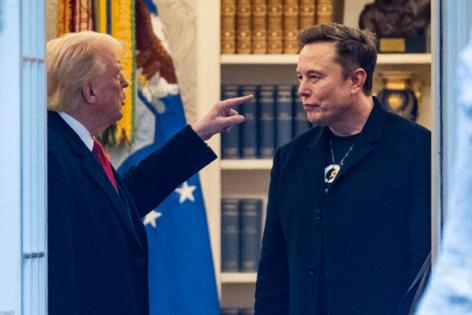Trump's spending bill is floundering in the Senate as Musk attacks intensify
Published in News & Features
WASHINGTON — The clamorous end to President Trump’s alliance with Elon Musk is increasing pressure on the White House over its signature legislation known as the “One Big Beautiful Bill Act” — a bill under intense scrutiny in the Senate that Musk wants killed over its price tag, but that Trump views as critical to the success of his presidency.
The bill faces strong headwinds among senators across the Republican spectrum, including fiscal conservatives who say it authorizes unsustainable spending, as well as moderates who fear the consequences of offsetting costly tax breaks in the bill with steep cuts to Medicaid.
Sen. Ron Johnson, a Republican from Wisconsin among those seeking to decrease spending in the bill, told NPR this week that it has “ no chance of passing” the Senate in its current form.
“It’s easy to be the parent that says, ‘We’re going to go to Disney World.’ It’s hard to be the parent that says, ‘yeah, but we can’t afford it,” Johnson told reporters on Capitol Hill Friday. “To get to yes, I need a commitment to return to a reasonable pre-pandemic level of spending.”
Trump’s relationship with Musk, the world’s richest man and the largest Republican donor during the 2024 presidential campaign, shattered on Thursday in an exchange of public insults between the two men. After leaving his role in the administration last week, where he was assigned to cut federal spending and government waste, Musk sounded off on the bill as an “abomination” that would cause the national debt to soar.
Trump responded by suggesting Musk opposed the legislation because it includes cuts to energy tax credits that have benefited Tesla, Musk’s electric vehicle company. The billionaire entrepreneur may also be angry, Trump mused, because his recommendation to head NASA was rejected — an important position for SpaceX, another Musk business.
Those comments set off an online tirade from Musk that claimed credit for Trump’s election victory and accused the president of links with Jeffrey Epstein, a notorious child sex offender.
“Without me, Trump would have lost the election, Dems would control the House and the Republicans would be 51-49 in the Senate,” Musk wrote on X, his social media platform. “Such ingratitude.”
Musk contributed over $280 million to Trump and other Republicans during the 2024 presidential campaign. But his tenure in the White House has come at a steep cost. Tesla’s profits plummeted 71% over the first three months of the year, with reputation rankings showing a similarly precipitous drop amongst consumers. In Thursday alone, as his feud with Trump escalated, Tesla’s stock price dropped 14%.
“I’m not even thinking about Elon,” Trump told CNN’s Dana Bash in a phone interview on Friday. “He’s got a problem. The poor guy’s got a problem.”
Musk was also quieter on Friday, focusing his social media activity on his companies, a sign that both men see mutual destruction in the fallout from their feud.
But the source of their feud — the bill — remains on thin ice.
The nonpartisan Congressional Budget Office estimates the bill could add $2.4 trillion to annual deficits over the next decade and result in 10.9 million people losing their health insurance, prompting GOP senators like Shelley Moore Capito, of West Virginia, where 28% of the state population is enrolled in Medicaid, to express concern.
But Senate Majority Leader John Thune, Republican of South Dakota, told reporters that the caucus is open to exploring cuts to another popular health program— Medicare, for Americans 65 and older — if it results in lowering the overall costs of the bill.
“The focus, as you know, has been on addressing waste, fraud, abuse within Medicaid and, but right now, we’re open to suggestions that people have them about other areas where there is, you know, clearly, waste, fraud and abuse that can be rooted out in any government program,” Thune said in a news conference.
Asked whether Medicare cuts are on the table, Thune replied, “I think anything we can do that’s waste, fraud and abuse are open to discussions.”
House Speaker Mike Johnson, a Republican from Louisiana, defended the bill against Musk’s attacks on Friday and said his calls to kill the bill were a “surprise.”
“I don’t argue with Elon on how to build rockets,” Johnson said. “I wish he wouldn’t argue with me about how to craft legislation.”
Johnson has said his goal is to have the legislation passed into law by Independence Day, before lawmakers start traveling home for a series of long summer recesses.
But there are other reasons for the deadline. The Treasury Department anticipates the country could risk default unless Congress raises the debt ceiling by August. And tax cuts passed in 2017, under the first Trump administration, are set to expire at the end of this year, leading Republicans to warn of a 68% tax increase if the bill fails.
©2025 Los Angeles Times. Visit at latimes.com. Distributed by Tribune Content Agency, LLC.







Comments